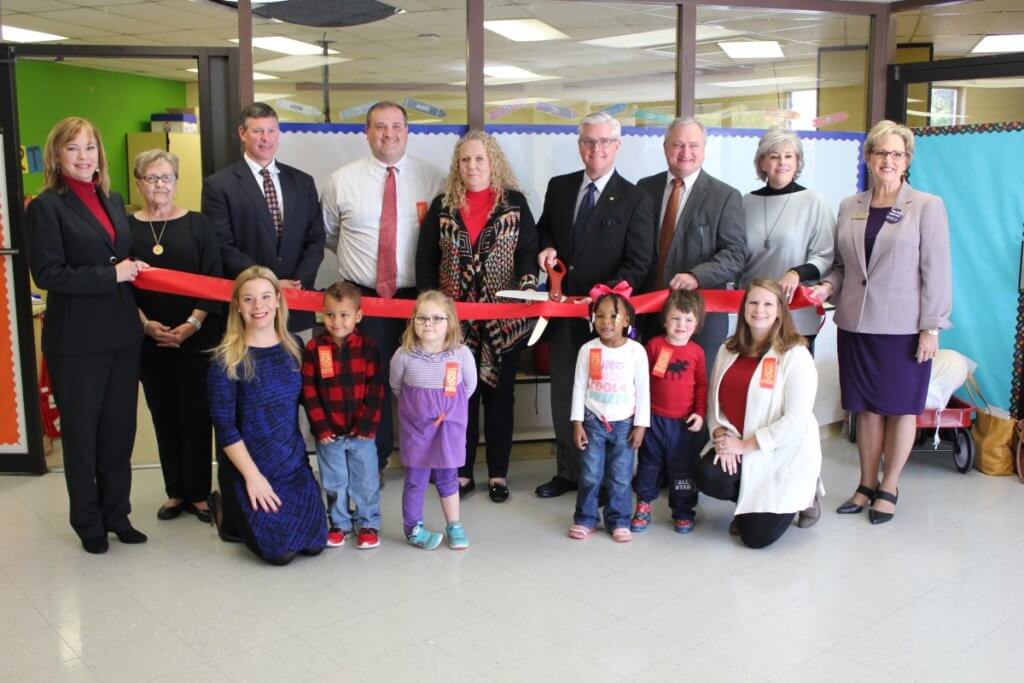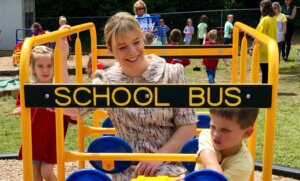Walker County, which just two years ago had the lowest pre-k access rate in the state, has increased the percentage of local four-year-olds enrolled in the Alabama First Class Pre-K program from two to 25 percent over the past two years. Since 2015, as state leaders have grown investments in Alabama’s high-quality, voluntary pre-kindergarten program, local leaders have successfully applied for state grants to add nine new classrooms across the county.
To celebrate the program’s growth locally, State Senator Greg Reed joined leaders from the Alabama School Readiness Alliance, the Walker Area Community Foundation, VOICES for Alabama’s Children and the Alabama Department of Early Childhood Education for a ribbon cutting ceremony welcoming pre-k students to their new classroom at Parrish Elementary. Following the ribbon cutting ceremony, the state and local leaders toured the new classroom.
“I know how important the early years of a child’s life are in laying the foundation for future success,” said Senator Reed. “Every family that wants to enroll their child in a high-quality Alabama First Class Pre-K classroom should be able to do so, but unfortunately this is not yet the case. I am proud that Walker County has made it a priority to expand First Class Pre-K locally, and I look forward to working with my colleagues in the Legislature to increase investments in the program so that more families can participate.”
In May, Parrish Elementary received a $150,000 First Class Pre-K grant to add a new classroom, support lead and assistant teacher salaries, and purchase developmentally appropriate materials. The new classroom at Parrish Elementary is one of four new Alabama First Class Pre-K classrooms in Walker County this school year.
Despite the additional classrooms, Walker County still lags behind the rest of the state in offering the program to its residents. Officials cited wait lists for First Class Pre-K across the county, including a wait list of more than 18 students at Parrish Elementary – enough to add a second classroom, if funds were available.
Statewide, 28 percent of four-year-olds are enrolled in Alabama’s First Class Pre-K program, which is managed by the Alabama Department of Early Childhood Education. While nearly 16,000 four-year-olds are enrolled in the program, another 13,000 were put on wait lists and will not be served due to lack of funding.
For 11-years in a row, First Class Pre-K has been ranked the number one state-funded pre-kindergarten program in the country for quality by the National Institute for Early Childhood Education. This year, there are 938 classrooms located across Alabama in various public and private schools, child care centers, faith-based centers, Head Start programs, and other community-based preschool settings.
The new classroom at Parrish Elementary was made possible due to a $13 million expansion of the state’s high-quality, voluntary pre-kindergarten program approved by the state legislature in the FY 2018 Education Trust Fund Budget, along with funding from year three of Alabama’s four-year federal Preschool Development Grant.
In 2012, the Alabama School Readiness Alliance’s business-led Pre-K Task Force launched a campaign to advocate for incremental increases in First Class Pre-K until the program is fully funded. ASRA has estimated that the state would need to appropriate a total level of funding of $144 million to give every Alabama family the opportunity to voluntarily enroll their four-year-old in a First Class Pre-K program. The current level of state funding for the program is $77.5 million.
“Students who participate in Alabama’s First Class Pre-K program outperform their peers in reading and math in every grade,” said Allison Muhlendorf, the executive director of the Alabama School Readiness Alliance. “Unfortunately, only 28 percent of four-year-olds in the state can enroll in a classroom due to limited state funding. State lawmakers have made it clear that giving more families an opportunity to participate in the Alabama First Class Pre-k program is a priority. It is crucial that leaders continue to increase First Class Pre-K investments until every family in Walker County and across Alabama has access to this proven program.”







